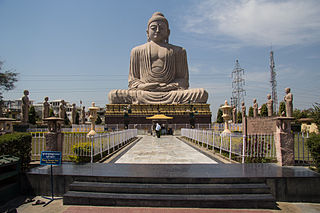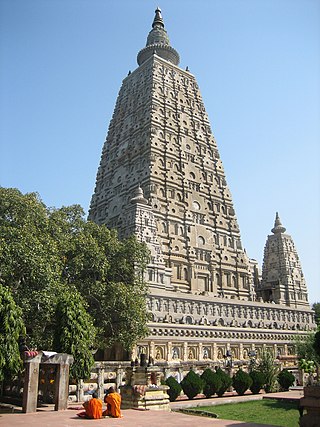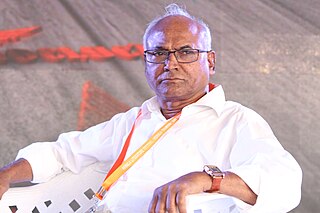Related Research Articles

Bodh Gayā is a religious site and place of pilgrimage associated with the Mahabodhi Temple complex, situated in the Gaya district in the Indian state of Bihar. It is famous for being the place where Gautama Buddha is said to have attained enlightenment under what became known as the Bodhi Tree. Since antiquity, Bodh Gayā has remained the object of pilgrimage and veneration, for both Hindus and Buddhists. In particular, archaeological finds, including sculptures, show that the site was in use by Buddhists since the Mauryan period. Bodh Gayā and the nearby regions were invaded and destroyed in the 12th century CE by Muslim Turk armies, led by Delhi Sultanate's Qutb al-Din Aibak and Bakhtiyar Khilji.

The Mahabodhi Temple or the Mahābodhi Mahāvihāra, a UNESCO World Heritage Site, is an ancient, but restored Buddhist temple in Bodh Gaya, Bihar, India, marking the location where the Buddha is said to have attained enlightenment. Bodh Gaya is 15 km from Gaya and is about 96 km (60 mi) from Patna. The site contains a descendant of the Bodhi Tree under which the Buddha gained enlightenment and has been a major pilgrimage destination of Buddhists for over two thousand years.

Jasraj was an Indian classical vocalist, belonging to the Mewati gharana. His musical career spanned 75 years resulting in national and international fame, respect and numerous major awards and accolades. His legacy includes memorable performances of classical and semi-classical vocal music, classical and devotional music, albums and film soundtracks, innovations in various genres including Haveli Sangeeth and popularizing the Mewati Gharana – a school of thought in Hindustani classical music. Pandit Jasraj taught music to amateur and professional students in India, Europe, Canada and the United States.

Kancha Ilaiah Shepherd is an Indian political theorist, writer and a Dalit rights activist. He writes in both English and Telugu languages. His main domain of study and activism is the annihilation of caste.

Vijay Goel is an Indian politician and a former Minister of State for Parliamentary Affairs and Statistic and Implementation in the NDA government. A former Minister of Youth Affairs and Sports, Goel is affiliated with the Bharatiya Janata Party (BJP). He became president of the Delhi unit of the BJP in February 2013. He was elected to Rajya Sabha from Rajasthan in 2014.

Thodur Madabusi Krishna is an Indian Carnatic vocalist, writer, activist, author and Ramon Magsaysay awardee.
The antiquities trade is the exchange of antiquities and archaeological artifacts from around the world. This trade may be illicit or completely legal. The legal antiquities trade abides by national regulations, allowing for extraction of artifacts for scientific study whilst maintaining archaeological and anthropological context. The illicit antiquities trade involves non-scientific extraction that ignores the archaeological and anthropological context from the artifacts.

Telangana State Archaeology Museum or Hyderabad Museum is a museum located in Hyderabad, India. It is the oldest museum in Hyderabad.
Hindu terrorism, sometimes called Hindutva terror or, metonymically, saffron terror, refer to terrorist acts carried out on the basis of motivations in broad association with Hindu nationalism or Hindutva.

Sangita Kalanidhi Aruna Sairam is an Indian classical vocalist and carnatic music singer. She is a recipient of the Padma Shri award from the Government of India and was elected as the Vice Chairman of the Sangeet Natak Academy by the Government of India until 2022. In 2011, Aruna was the first Carnatic musician to perform at the BBC proms in London. She is also the first Carnatic musician to perform in Oud Festival of Israel (Jerusalem).

Located on the strategic crossroads of Iran, India, China and Central Asia, Afghanistan boasts a diverse cultural and religious history. The soil is rich with archaeological treasures and art that have for decades come under threat of destruction and damage. Archaeology of Afghanistan, mainly conducted by British and French antiquarians, has had a heavy focus on the treasure filled Buddhist monasteries that lined the silk road from the 1st c. BCE – 6th c. AD. Particularly the ancient civilizations in the region during the Hellenistic period and the Kushan Empire. The world's oldest-known oil paintings, dating to the 7th c. AD, were found in caves in Afghanistan's Bamiyan Valley. The valley is also home to the famous Buddhas of Bamiyan.

Anaida Parvaneh is an Indian singer and chef. She was the first singer to release a single in India in 1995. She is currently a chef with the Soda Bottle Opener Wala chain of cafes and a Chinese healer.

Since 2014, the Islamic State has destroyed cultural heritage on an unprecedented scale, primarily in Iraq and Syria, but also in Libya. These attacks and demolitions targeted a variety of ancient and medieval artifacts, museums, libraries, and places of worship, among other sites of importance to human history. Between June 2014 and February 2015, the Islamic State's Salafi jihadists plundered and destroyed at least 28 historic religious buildings in Mosul alone. Many of the valuables that were looted during these demolitions were used to bolster the economy of the Islamic State.
On January 2 2016, 4 militants belonging to Islamic terrorist United Jihad Council attacked the Indian Air Force's Pathankot Airbase, part of its Western Air Command.
India Pride Project (IPP) is a grassroots group of art enthusiasts who use open source intelligence to identify stolen religious artefacts from temples in India in order to facilitate their return. Co-founded in 2014 by two Singapore-based art enthusiasts, S. Vijay Kumar and Anuraag Saxena, it now has activist volunteers from all over the world.

The Bhagavadajjukam is a Sanskrit farce composed in the 7th century CE, usually attributed to Bodhayana. However, inscriptional and scholarly evidence indicate that the play was written by the Pallava king Mahendravarman I, who also wrote a prominent farce known as the Mattavilasa Prahasana. It is one of the two earliest surviving examples of a satirical play in Sanskrit literature. Featuring witty exchanges, an episode about the transmigration of souls and a discussion on Hindu dharma, the comical play was intended to mock the doctrines of Buddhism, whose rise at the time presented a challenge to the dominance of Hinduism in India.
Abha Narain Lambah is an Indian conservation architect whose eponymous architectural practice has restored several of India's UNESCO World Heritage Sites like the Ajanta Caves, Golconda Fort and Mahabodhi Temple, and Mumbai's Victorian buildings like the Crawford Market, Royal Opera House, Asiatic Society of Mumbai Town Hall and Knesset Eliyahoo Synagogue.

Vinai Kumar Saxena is an Indian business executive who is currently serving as the 22nd Lieutenant Governor of Delhi since 2022. He previously served as chairman of the Khadi and Village Industries Commission from 2015 to 2022.
Nancy Wiener is an antiquities dealer who pleaded guilty to charges of conspiracy and possession of stolen property.
References
- ↑ Rangarajan, Malathi (July 17, 2016). "Ensure quality through certification". The Hindu– via www.thehindu.com.
- ↑ "These NRIs aim to bring back India's lost artefacts | Bengaluru News - Times of India". The Times of India. 25 April 2016.
- 1 2 "Restoring India's Heritage". span.state.gov.
- ↑ Attiah, Karen. "Opinion | Is it okay to steal back looted colonial-era treasures?". Washington Post. ISSN 0190-8286 . Retrieved 2020-11-03.
- ↑ "Reclaiming India's Stolen Cultural Heritage". thediplomat.com. Retrieved 2020-11-03.
- ↑ "BBC World Service - Newshour, Hunting down stolen Indian artefacts". BBC. 9 June 2016.
- ↑ "GNI : Singapore banker sets off campaign to bring back India's Treasure". 22 January 2017 – via www.youtube.com.
- ↑ Hebbar, Nistula (June 8, 2016). "Idol trackers elated as Ganesha set to come home". The Hindu– via www.thehindu.com.
- ↑ "'Unesco estimated that India lost 50,000 artefacts till 1989 … our biggest victory has been the narrative war'". Times of India Blog. 2018-09-19. Retrieved 2020-11-03.
- ↑ "Our heritage is the singular reason for which the world comes to India: Anuraag Saxena". Hindustan Times. 2019-03-01. Retrieved 2020-11-03.
- ↑ "Why it's time the Queen of England returns all that she has stolen". www.dailyo.in. Retrieved 2018-05-05.
- ↑ Saxena •, Anuraag (August 29, 2017). "Blood Buddhas: How Indian Heritage Fuels the Terror Machinery".
- ↑ "Indian antiquities under threat: Are we aware of the implications? - Times of India". The Times of India. 27 August 2017. Retrieved 9 December 2017.
- ↑ "Heritage crimes: Let's get our past back". The Sunday Guardian. 9 October 2016. Retrieved 9 December 2017.
- ↑ "Why be a part of Unesco if it's not protecting or projecting India?". Hindustan Times. 8 December 2017. Retrieved 15 January 2018.